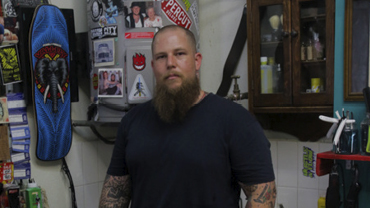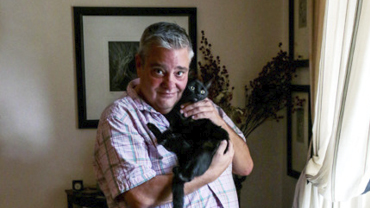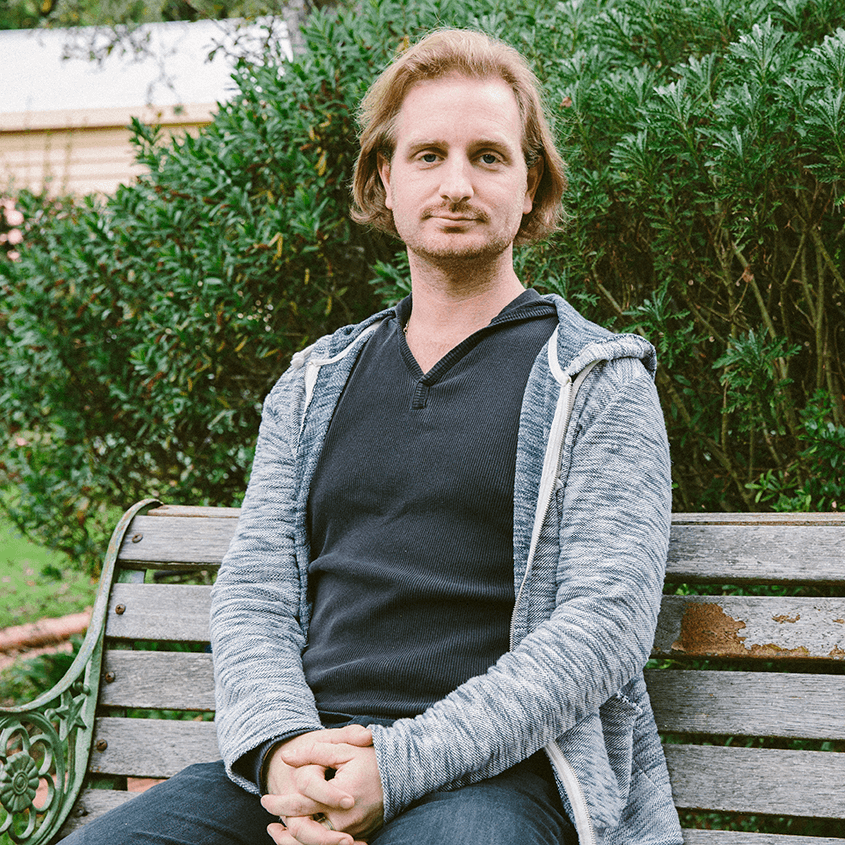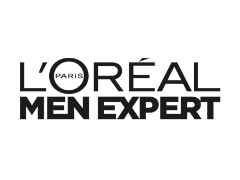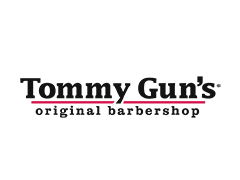In the latest installment of the Movember Podcast, our host and co-founder of the Movember Foundation Adam Garone sits down with recently retired Canadian astronaut, Chris Hadfield. He’s the first Canadian to walk in space, the voice of mission control to orbiting astronauts, and commanded and lived on the International Space Station for six months.
Chris Hadfield was 9 years old when he saw Neil Armstrong make that first small step onto the moon. It was that night, on July 20th, 1969, that he too decided he would become an astronaut. The Hadfield family is a flying family, with Chris’ father and two brothers having flew for Air Canada. After Chris joined the Canadian Armed Forces in 1978, he spent the next two decades working for the Canadian Space Agency. In 1992, Chris was accepted into the Canadian Astronaut Program by the Canadian Space Agency, where he embarked on a prosperous career as a world-renowned astronaut.
Adam and Chris had exactly 35 minutes for a walk and talk, a handshake and photo op, and a sit down in a hotel in Toronto.
ADAM: So, do you ever think you'll be back in space?
CHRIS: I don't expect to have a chance to fly in space again. The technology is improving rapidly. The things that some of the leading inventors are doing, what Jeff Bezos is doing, what Elon Musk is doing, what Boeing is doing is lowering the bar of entry to space lower than it's ever been. But I have had the tremendous spaceflight experience. I've been off the world for half a year commanded a ship. It’s as if I was a Formula One racer for a bunch of years and someone said, "Hey you want to want to ride on my unicycle?" And I'm like, "Well, ok, but once you get a quick ride of the unicycle, it's just not the same, you know as the richness and the depth of the complexity of the experiences I have had.
But, if suddenly space flight becomes more readily available, I would love the chance to go to the moon. That may happen while I'm alive. We'll see.
My intent was never to try and check something off on some list. My intent was to challenge myself to do something that was right on the very hairy edge of possible. Or even well into the realm of impossible and see if somehow I could build a set of circumstances that would allow me to prevail and do well at that. And those challenges are always out there - one more flight in space wouldn't necessarily accomplish any of those things.
ADAM: In terms of work-life balance, with your intense career choice and a young family at home, how did you manage that?
CHRIS: I think if you're looking for work-life balance you are forever going to drop the ball. What you need to recognize is that your work is a major and important part of your life. So it's not a matter of either/or. You need to figure out how to recognize that your work has value in the decision-making of your life and don't think, "Oh my work is a big negative, if only I didn't have to work, then I could have a good life." Now, maybe it's something I got from my own father, but I've always looked at it the other way around. How can I enjoy my work? How can I make work so interesting and challenging for me that it helps define my life, the pleasure of my life? And at the same time, enable my wife and myself and my kids to lead a good life? How can you do all those things at the same time? And you never get it right.
If you focused everything on one facet of it, then everything else is going to suffer. So I think the real key is to be passionately interested and as good as possible at the things you are doing, whether it is reading your child a book, going for a walk with them, taking them to the park, doing your work, driving to work or getting ready for the thing you're going to do next year, trying to take it all seriously and do it all as well as you can. Take pleasure in it all. There is great pleasure in work. And there's great pleasure in play and child rearing and they'll all drive you crazy. But it's your choice whether you go crazy or whether you have a great time or not.
Chris was working as a NASA astronaut in 2003, when the Space Shuttle Columbia disaster occurred - the shuttle disintegrated upon reentering Earth's atmosphere, killing all seven crew members.
ADAM: In 2003 with the space shuttle Columbia Disaster, it must have been a pivotal time in your life. You knew the crew - you knew the commander very well. How did that moment affect you?
CHRIS: When good friends of yours die it forever leaves a scar and a hole. An unfulfilled emptiness. The closer they were to you, the deeper all that is. My first good friend, my best friend on squadron, a guy named Tristan De Koninck died very violently in an F18 crash. He had two little girls, same age as my two little boys at the time. We were the best of friends, guitar players together. Huge respect for his flying ability and he hit the ground and died one day. I don't ever want to get over that as if it didn't matter but at the same time, the scar tissue that started to form, it helped me in subsequent losses of friends.
My professions have been dangerous - I've lost a lot of friends violently doing their job. Like a lot of people in the military or other professions, with each one it doesn't lessen the grieving or the impact of it, but at least it gives you some sort of capability to deal with it I think. When Columbia came apart, on its reentry into the atmosphere and the seven crew onboard were essentially beaten to death. Their bodies fell, gosh, tens of miles and landed on the earth... It was just crushingly, emotionally horrific.
But then, fairly shortly, you just look around and say, "What should we do next?" Rick Husband, the commander of Columbia, and I went to test school together. We sang together. He was an excellent fellow. He took care of my family during one of my launches, he went to the airport late because my folks' flight was delayed and Rick had driven to Orlando Airport and picked up my folks and brought them to my launch. I’d done the same for other astronauts during their launches. So, I just looked at it from that point of view: if it had been me coming back and that had been Rick on the ground, what would I have expected Rick to do? Would I have expected him to say, "That's it, I quit!" I mean that would just, it's a ridiculous response in my mind. I would have expected Rick to say, "Take care of the families, and then let's start looking at the problem and then let's try and convince the world that we can be trusted to fly a spaceship again."
I felt as culpable and guilty as anybody else. I was an experienced astronaut. I'd flown twice in space. I'd watched that piece of foam come off in the video and I had done nothing, just like everyone else. I didn't stand up and put my badge on the line and say, "Hey, I demand that we do a spacewalk." I made the same incorrect value judgment and technical judgment and I helped condemned those guys to death. But it's an imperfect science and you'd never be able to get all the information you need to make a decision. You have to do the best you can. And that's what everyone was doing. No one was malicious in any of their decision making.
But we learned a huge amount from it. We never hurt another person on the shuttle flight, we completed building the space station. We even went to Hubble a few times and continued to improve the best telescope human beings have—and it's taught us the age of the universe. We turned that loss, and it was an egregious one into as useful a human event as we possibly could. Learn from it. Don't just grieve for them, but actually try, and try and make things better as a result of what they did. And that's exactly what I would have wanted people to do if one of my spaceships had come apart.
ADAM: So how did you reconcile that as a dad and husband?
CHRIS: First, you need to decide what it is you want to accomplish in life. What is it that you’re trying to do? If I'm trying to do nothing, and then I don't want to take any risks. If I'm trying to just live as long as possible, then my risk management is quite different. What is my goal? Is it to be the first person to make it to 127? Ok. Well in that case my threats are quite different - I need to have a very special diet and exercise regime. Or am I trying to climb Everest, or be Sebastian Coe or Prime Minister of Canada? What is it I'm trying to accomplish? Every one of those things that I choose as my endgame in life is going to dictate how I'm going to manage the risks in my life. What are the risks that are counter to my objective of my endgame? Whether you do it consciously or not, that is the life that you're in. In my case, I thought exploring the rest of the universe in person is what I want to do. So there are risks. So now my job is not avoiding risks, my job is managing those risks, learning about them, trying to understand them as clearly as I possibly can. And if you're sharp enough, you can beat some of those where they would kill someone who wasn't quite ready. And so it changes your entire job.
Your job is not about crossing your fingers and whistling past the graveyard and hoping. Your job is about absolutely facing up to the danger that's there and learning how to be the person that can defeat it. Then that makes you optimistic and comfortable. Going, ok: this is the job I'm doing. I'm not a guy who's just cowering and hoping that my number doesn't come up today. I'm actually a person very actively involved in my own success and survival.
It involved having very frank conversations with my family, with the kids at first they were too young, but for my third flight they were old enough. And with my wife of course. My wife she recognizes that giving up on your dreams is not free. And if she had said, "You can't fly in space anymore," that doesn't come for free. “Remember that big dream your had? You can't do that because I am afraid.” But what does that do for the rest of my life and my own self-worth and my own hopes and dreams.
The two of us have always tried to encourage the other person to the pursue the things they're interested in, whether they're long term or short term. My wife at one point said, "I want to go to law school." I'm like really? Law School? Cool. That would be great. That sounds really interesting. And she went to law school full time for a year and then she realized, "it's not what I thought it was going to be. It's not what I'm interested in."
So that's how we have approached our relationship and then including the children as they get older. Recognizing that everything worth doing in life carries some sort of risk and your job should not be to slink away from life, and hoping that somehow that will allow you to avoid any sort of negative consequence. We're all going to die. Every single one of us.
The real question is: What do you get done while you're alive and how close is that to the things that are important to you? In my case it was a relatively clear career choice and my wife just said, "Okay, he's doing a dangerous thing, so let's make sure he is free to spend as much time as possible to get as good at it is he can, but, he might die so if he dies let's think about that." I won't be able to live in the United States after he's dead because there's no visa or anything that's going to keep me here. So where am I going to move back to, what will I do, what career will I follow? Do we have enough insurance? We're going to need this much money. Let's just make a plan and accept the fact that this is just a potential consequence of his choices and our mutual choices. So, we tried to approach it that way. Fortunately, so far I didn't die, and we've both been able to pursue a lot of things we're interested in and there's been an enormous amount of reward and interest and satisfaction and new experience as a result of having taken those risks.
ADAM: In a TV interview, your parents were asked to describe you. There was a pause, and then they said, "capable." Why do you think that is?
CHRIS: In my family, being useless, being incapable, being unable is the opposite of what everyone's trying to do. If you can't do something, why not, and if you can't, then start figuring out how until you know how to do this thing. I thought that was funny at the time, too, that that was the word that they chose: capable. You know, it's not exactly gushing with emotion but they're immensely prideful. My mom calls it "BIRGing"—basking in reflected glory and she will stop a whole airplane full of people and announce who her son is, which is embarrassing for me and my brothers and sisters. I've spent my whole life trying to become qualified to do the things that I dreamed of doing.
ADAM: Can you describe the relationship you had with your father?
CHRIS: My father was both strict and interested in us and with us. He’s worked eight hours a day, seven days a week, his entire life. Always. That's just what he does: you get up and have a big list of stuff you're going to do and you do it and in the evening you relax. I learned early on from him the pleasure of work, and the sense of satisfaction of having accomplished something that you wanted to do that day. He was quite a strict father. Probably indicative of how he was raised by his grandfather, who was a regimental sergeant major in the Highland light infantry.
My father, interestingly enough, was one generation out of phase, because he was raised by his grandfather. His grandfather was from Yorkshire and fought in the First World War. So it's almost as if my dad was raised one entire generation ahead of the time that he was in. It gave him a slightly different set of values. And it led him to raise us - I have two brothers and two sisters - on a farm. It was a very physical and labor-intensive upbringing, growing up on a farm, a big, working farm, 500 acres. But my dad was not only a farmer—and very much a hands on mechanic but also an airline pilot. So that level of both technical and global awareness as well as the level of responsibility that comes with taking three or four hundred people all around the planet. I have great respect for him. I don't agree with all of his values—what son does—but and I'm still learning stuff from him, even though he's 83.
ADAM: What was the best bit of advice that you can remember?
CHRIS: When I was getting ready for my third spaceflight, the first two were launching out of Florida, so not too far from Canada, so it was easy for my dad to get there. My third space flight launch from Baikonur, Kazakhstan. Not nearly as easy to get to. Quite a trial in fact. And my dad, around 80 at the time, and my mom, they just said, "I think we'll watch this one on television." So, he sent word secondhand via my older brother and what my father passed on was to trust yourself. Those are the words to me: "You have been working at this your whole life, you've gathered a huge amount of experience, you've already flown in space twice. You have proven that you have all these capabilities, but now you're about to be split off from the rest of the planet. You are going to be in a position where you have to make autonomous and irreversible decisions that are life and death and high consequence. And to remember to trust yourself. You didn't get this far by chance." So throughout the entire half a year when I was on the spaceship, once in a while, my dad's voice would drift somewhere in the back of my head and there were several times where... Where his advice was right on the money.
ADAM: So as a father of three, how did that change you as a husband as a man when you became a dad?
CHRIS: Being a father is an immense and eternal responsibility. That's how I see it. It's the easiest of things. I remember a standup comic, I forget which one, in the past, who says: "you need a license to drive, you need a license to fish, but you do not need a license to be a father." Which just seems difficult to understand from a way to organize society, but it's just inevitable. Sex is an overpowering urge. We're never going to be short on procreation, it's just biologically the same as most other animals. So fatherhood is often a consequence of not extremely deep thinking. Fatherhood is just a natural condition for an adult male. And my wife and I met very young. She was fourteen when we met, just turning fifteen, I was sixteen, and we dated for six years, got married, and then had three children.
In our case it was fairly deliberate. She finished university before I did, she had a career, but the military was going to post me to remote places. And she was not going to be able to pursue her career for a few years and we both recognized that we can't equally pursue our own interests simultaneously throughout our entire lives. There's going to be time when one person's takes precedence over the other's. So, we just said, "OK we're going to get posted to Moose Jaw, Saskatchewan and Cold Lake, Alberta, and Chicoutimi, Quebec. Let's use this time to have children and so we had one child while we were in Moose Jaw, one in Cold Lake, and one in Chicoutimi, Quebec. It was extremely hard on my wife. She's professional, smart, university educated and suddenly she's home with three kids in three years. They were three, one, and zero and I was focusing so hard on trying to be good at what I was doing, becoming a competent pilot, and then a fighter pilot, and then being a NORAD fighter pilot in the Cold War, defending North America against armed Soviet bombers coming across through the Greenland-Iceland gap. It took a lot of work on my wife and my part to try and find the constantly shifting normal.
ADAM: You've had an extraordinarily successful career. How did you manage the expectations your children must have had to try and emulate your success, which, must be very hard. How did you go about managing that and the expectations you set with them?
CHRIS: I think it is hard on my children, especially my sons. The three of them have looked at what I've done, looked at what my wife Helena has done and then looked at themselves and decided how they want to conduct life. And if every time you say your last name out loud, everyone knows who your mother or your in this case, who your father is, then you hardly ever get judged on who you are. If, you're, I don't know, choose someone, Chelsea Clinton. I think she's a remarkably capable young person - smart, she's got the university degrees and a track record to prove it, but she will never be herself. She will always be the child of two very famous and very influential people. And there's lots of folks like that in the world. It's for better or for worse. Our children had great opportunity. They got to be exposed to influences and people, situations and a world that they would never have seen otherwise.
As they get older, the problem becomes more significant, and when they really start to try and be successful independently, I think that's when it's the hardest. When they're in their 20s and 30s, that's when it's the hardest for them to truly be an original individual, just respected for the things that they've done. There's never going to be any perfect answer. But it's something I still try and work on with all three of my kids. And my daughter, who basically just says, "if there's any hint of nepotism, if there's any hint that someone is doing this because of the family name or my dad's helping," then I won't do it. I'm just going to forge my own path.
Probably the most interesting part is my eldest moved to China. Because in China I'm not famous and he can just be his own man over in China and he's been there for fifteen years.
ADAM: So, you love music. You're a big fan of David Bowie. How would you describe his legacy and his impact on you?
CHRIS: I've always been a musician. My mom is a well-trained piano player and natural harmony singer. Both my sisters played piano. Both my brothers play guitar. We always played music, growing up in a farm, you're mostly your own entertainment, so always music. My son suggested, "You ought do a cover of Space Oddity while you're up there." I'm going, "Space Oddity, you kidding, it's a Bowie tune? You can't just cover Bowie." And the Christmas just before he died, I watched that old thing he did with Bing Crosby where they do a really lovely little harmony version of Little Drummer Boy, which I've liked since it came out in the 70s and Lazarus from his last album, which was just this raw, naked, tortured, expose of his soul. Then he died a couple weeks later, and I understood why he did Lazarus, but—I have just great respect for him as a person. Because my limited interaction with him, we just emailed back and forth a bunch as a result of me covering Oddity, every single interaction he was respectful, funny acerbic, his own guy, insightful. He sent me an email out of the blue when I released an album of music and just congratulated me - he was exactly as you would hope someone like that might be. Intensely famous, intensely private, even his own death, or at least his illness, he kept quite private, but I have just great respect for him.
ADAM: If there was a capability to pick up the phone and call 18-year-old Chris Hadfield, what advice would you give him?
CHRIS: Trust yourself. Probably.
ADAM: Good advice from your dad, passed back.
CHRIS: Yeah. I recognized that I hardly knew anything. I had various abilities and various inabilities. Recognized that if I'm going to do the things I'm dreaming of, then there's a long list of qualifications I'm going to have to get past in order to convince anybody that they should trust me to fly a spaceship or anything even close. And I'm going to have to take each one seriously and see if I can make it past every one of those thresholds.
I've always viewed my life as: how well can I do with this thing I'm doing now, in order to open doors and possibilities to do stuff that I'd like to do in the future. Can I learn how to play this complicated lick on guitar, so that then I can play along with this person, or can I learn some words in this language so that I can communicate with that person. It's just an endless challenge of trying to mold my own abilities to do things that I'm dreaming of doing. And that was exactly the same at 18. I had an even less formed understanding the world then than I do now. But at that age I made the decision, after high school, "let's take a year off, let's get some work, and let's just go bum around for a while, get to know some things for myself, get a little bit older before I commit to going to university." And that was a good decision to make. There are very few big decisions I made in my life that I regret because they've led to the experiences that I've had. So I think, going back to yourself at 18 years old, giving yourself the confidence to pursue the things that are important to you and recognizing that none of it's going to come easy. None of it's going to go as planned. And it really entirely is up to you.
ADAM: Chris. It's been an absolute honor to have you on the podcast.
CHRIS: That's a nice thing to say. Thanks!
ADAM: I also wanted to thank you for all of your support of Movember over the years, and for rocking that mustache.
CHRIS: Yeah, on my eighteenth birthday I was taking the tail end of the of the Orient Express. I got on the train in in Venice and it cut north and went what was then Yugoslavia, and we're on our way to Istanbul, and that was the day, as I turned eighteen coming through Bulgaria that I ceased shaving my upper lip. It took years before I had any sort of mustache to be proud of. But my wife likes how I look with a moustache.
It’s something as simple and natural as a subset of facial hair, but being used in order to get people to recognize that there are health and mental issues, that should be addressed. So, I'm happy to support Movember.
To listen to more real conversations with inspirational people from around the globe, click here. If you like what you hear there, please subscribe, and share it with your friends - it really helps others find us.
If you want to find out more about the work the Movember Foundation does, please click here.

October 11th, 2017
In this exclusive interview for this season of the Movember Podcast, our host Adam Garone catches up with celebrated Canadian astronaut, Chris Hadfield.
Chris Hadfield: ‘My intent was to challenge myself to do something that was right on the very hairy edge of possible’
22 MIN READ

